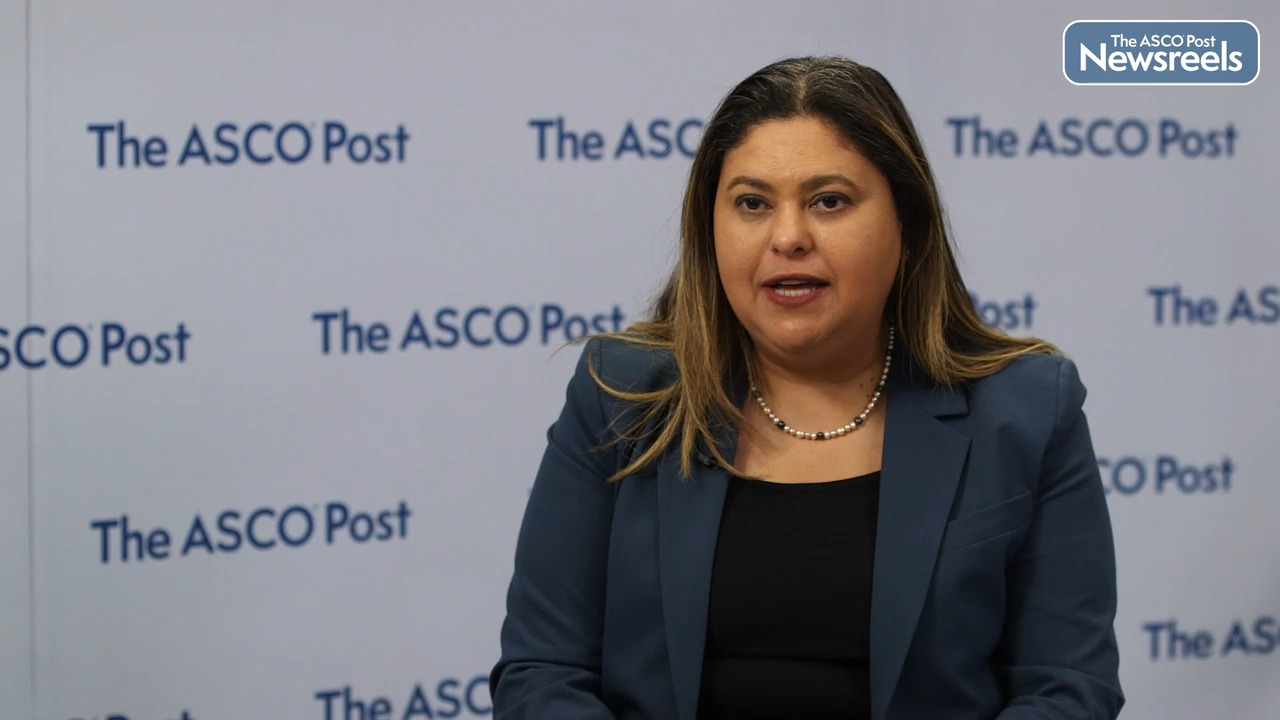LaQuisa C. Hill, MD, on Relapsed or Refractory T-ALL: New Data on CD5 CAR T Cells
2023 ASCO Annual Meeting
LaQuisa C. Hill, MD, of Baylor College of Medicine, Houston Methodist Hospital, discusses study findings showing that CD5 chimeric antigen receptor (CAR) T cells may induce clinical responses in heavily treated patients with relapsed or refractory T-cell acute lymphoblastic leukemia. Manufacturing CD5 CAR T cells with tyrosine kinase inhibitors seemed to improve their potency and antitumor activity (Abstract 7002).
Transcript
Disclaimer: This video transcript has not been proofread or edited and may contain errors.
LaQuisa C. Hill, MD:
The purpose of this study was a phase one clinical trial that was a dose escalation study using autologous CD5 CAR T for treatment of patients with relapse/ refractory T-cell ALL. In the initial cohort, we used our standard manufacturing practice that was overall very well-tolerated. However, in the eight patients initially treated, there were minimal responses seen with only one patient achieving a MRD positive remission.
We subsequently analyzed the cell products and determined that the CAR T cells had a significantly exhausted phenotype as a result of chronic CAR signaling. Therefore, we implemented a manufacturing change to include the use of TKI inhibitors dasatinib and ibrutinib in order to inhibit the chronic CAR signaling and saw a significant improvement in the naive T-cell repertoire and significant reduction in the number of exhausted T-cells in the final product. In the next cohort, we treated a total of seven patients, all manufactured using the TKI inhibition. And amongst those patients there was a total of four MRD negative remissions achieved out of seven patients treated.
The CAR T cell was well-tolerated in terms of CRS and ICANS. No grade-three events occurred. However, there was an increased risk of, or observation of, EBV reactivation with two patients developing PTLD. Currently it is unclear of the direct relationship to the CD5 CAR T cells manufactured with TKI. However, we plan to continue vigilant monitoring for this unexpected side effect and have instituted mitigation plans utilizing prophylactic rituximab as well as ensuring that patients have EBV-specific virus T cells available in the event that EBV reactivation occurs.
Moving forward, we will continue to try and optimize the CAR T cell product both for efficacy and safety and are looking into alternative immune effector subsets, such as virus-specific T cells as the immune factor cell of choice, as well as considering use of third-party or off-the-shelf T cells from healthy donors.
The ASCO Post Staff
Smitha Krishnamurthi, MD, of the Cleveland Clinic, and Deb Schrag, MD, MPH, of Memorial Sloan Kettering Cancer Center, discuss phase III findings from the PROSPECT trial, which showed FOLFOX chemotherapy with selective use of radiation therapy and sensitizing fluoropyrimidine (5FUCRT) is noninferior to 5FUCRT for the neoadjuvant treatment of patients with locally advanced rectal cancer, prior to low anterior resection with total mesorectal excision (Abstract LBA2).
The ASCO Post Staff
Nagla Abdel Karim, MD, of the Inova Schar Cancer Institute, University of Virginia, discusses phase II data showing that maintenance atezolizumab plus talazoparib improved progression-free survival in Schlafen-11–selected patients with extensive-stage small cell lung cancer. This study demonstrated the feasibility of conducting biomarker-selected trials in this disease, paving the way for future evaluation of novel therapies in selected populations (Abstract 8504).
The ASCO Post Staff
Narjust Florez, MD, of Dana-Farber Cancer Institute, and Ticiana Leal, MD, of Winship Cancer Institute of Emory University, discuss the use of tumor treating fields therapy, in which electric fields disrupt processes critical for cancer cell viability. Already approved by the FDA to treat glioblastoma and mesothelioma, the treatment has extended overall survival in this phase III study of patients with metastatic non–small cell lung cancer (NSCLC) with progression on or after platinum-based chemotherapy, without exacerbating systemic toxicities (Abstract LBA9005).
The ASCO Post Staff
Bobbie J. Rimel, MD, of Cedars-Sinai Medical Center, and Isabelle L. Ray-Coquard, MD, PhD, of Centre Léon Bérard and the University Claude Bernard Lyon Est, discuss findings from the COLIBRI trial, which showed that, for patients with cervical squamous cell carcinoma, neoadjuvant nivolumab plus ipilimumab is safe and orchestrates de novo immune responses. The 82.5% complete response rate for primary tumors 6 months after standard chemoradiation therapy suggests favorable clinical outcomes (Abstract 5501).
The ASCO Post Staff
Muhit Özcan, MD, of Turkey’s Ankara University School of Medicine, discusses phase II findings from the waveLINE-004 study. It showed that the antibody-drug conjugate zilovertamab vedotin had clinically meaningful antitumor activity in patients with relapsed or refractory diffuse large B-cell lymphoma (DLBCL) who experienced disease progression after, or have been ineligible for, autologous stem cell transplantation and/or chimeric antigen receptor T-cell therapy (Abstract 7531).





